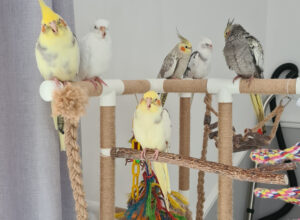Preventing Cockatiel Boredom
- Understanding Boredom: Recognise signs of boredom in your cockatiel and why it’s harmful.
- Engagement Strategies: Learn to keep your cockatiel entertained through various methods.
- Environmental Enrichment: How to optimise your cockatiel’s cage and surroundings for stimulation.
- Interactive Play: The importance of bonding and interactive play for mental health.
- Routine Care: The role of daily care routines in preventing boredom.
Cockatiels, like any other pet, require attention, care, and stimulation to live a happy and healthy life. Boredom can lead to stress, behavioural issues, and even health problems. As a cockatiel owner and enthusiast, I’ve gathered practical advice and strategies to prevent boredom in these charming birds. There’s never a dull moment in my flock!
Cockatiel Boredom
Cockatiels are intelligent, social birds known for their companionship and charming personalities. However, their intelligent nature means they can easily become bored if not provided with enough stimulation. This article aims to guide fellow cockatiel owners through the process of enriching their feathered friends’ lives, preventing boredom, and fostering a healthy, stimulating environment.
Signs your cockatiel is bored
Boredom can manifest in various ways, such as feather plucking, lethargy, aggression, and repetitive behaviours. It’s vital to observe your cockatiel’s behaviour regularly to detect any signs of boredom early.
How To Prevent Cockatiel Boredom
1. Optimising the Cage Setup
A stimulating cage environment is the foundation of a boredom-free life for cockatiels. This involves more than just a spacious cage; it’s about how you utilise the space.
- Perches: Offer a variety of perches at different heights and textures. This not only promotes physical health but also keeps your cockatiel engaged. Choosing the right perches is essential for their foot health and overall well-being.
- Toys: Rotate toys regularly to keep the environment fresh and engaging. Incorporate foraging toys, ladders, and bells (with safe attachments). Toys are not just accessories; they’re crucial for mental stimulation.
Essential Toys and Their Benefits
| Toy Type | Benefit |
|---|---|
| Foraging Toys | Encourages natural foraging behaviours |
| Ladders & Swings | Promotes exercise and exploration |
| Bells & Chimes | Auditory stimulation and interaction |
- Safe Space: Ensuring a safe cockatiel environment is paramount. Avoid placing the cage in draughty or overly sunny locations and ensure all toys and accessories are bird-safe.
2. Dietary Enrichment
A varied diet not only meets nutritional needs but also provides mental stimulation. Introducing new foods can be an exciting challenge for your bird.
- Variety: Incorporate a mix of seeds, pellets, and fresh fruits and vegetables. Safe and nutritious options can be found in the guide on safe fruits and veggies for cockatiels.
- Foraging: Mimic wild foraging behaviours by hiding food in toys or scattering it around the cage for your cockatiel to find.
Recommended Diet Variety
| Food Type | Examples |
|---|---|
| Seeds | Millet, sunflower seeds (in moderation) |
| Pellets | High-quality, formulated pellets |
| Fruits & Veggies | Carrots, apples (no pips), broccoli (no avocado) |
Interactive Play and Training
Engaging directly with your cockatiel strengthens your bond and provides essential mental and emotional stimulation.
- Daily Playtime: Dedicate time each day for play and interaction outside the cage. This can include training sessions, cuddles, or simply talking to your bird.
- Training: Teaching new tricks or commands not only entertains your cockatiel but also enhances communication. Basic command training can be rewarding and fun. Training your cockatiel requires patience and consistency.
4. Routine Care
Consistent daily routines in feeding, cleaning, and interaction times provide a sense of security and prevent boredom.
- Regular Check-ups: Regular visits to the vet for health checks ensure your cockatiel remains in top condition. Understanding and identifying signs of illness early can prevent many health-related issues. Cockatiel veterinary care is crucial for their overall well-being.
Conclusion
Preventing boredom in cockatiels requires a multifaceted approach that includes enriching their physical environment, providing a varied diet, engaging in interactive play and training, and maintaining a routine of care. By implementing these strategies, cockatiel owners can ensure their feathered friends lead happy, healthy, and stimulating lives. Remember, a stimulated cockatiel is a happy cockatiel.

